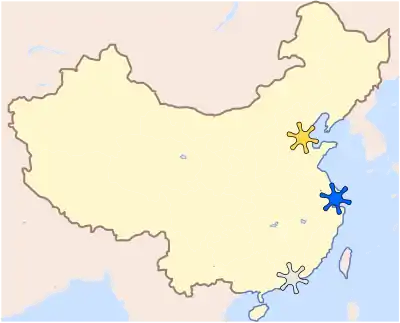Bohai Economic Rim

The Bohai Economic Rim (BER) or Bohai Bay Economic Rim (BBER) is the economic region surrounding Tianjin (Tientsin). It also includes areas in Hebei, Liaoning and Shandong surrounding the Bohai Sea. This region has undergone major economic and infrastructural changes and is an emerging economic powerhouse of North China, rivaling both the Pearl River Delta in southern China and the Yangtze River Delta in eastern China. [1]
Economy
The Bohai Economic Rim has traditionally been involved in heavy industry and manufacturing. Tianjin's strengths have always been in aviation, logistics and shipping. Beijing complements this with strong petrochemical, education and R&D sectors. The area is becoming a significant growth cluster for the automobile, electronics, and petrochemical sectors, especially with Shenyang's automotive industry, software and aircraft, Dalian attracting foreign investments in manufacturing and Qingdao for its health services.[2][3]
The Chinese central government has made it a priority to integrate all the cities in the Bohai Bay rim and foster economic development. This includes building an advanced communications network, better highways, increased education and scientific resources as well as tapping natural resources off the Bohai rim.[4]
In recent decades, petroleum and natural gas deposits have been discovered in Bohai Sea.
Transport
Air
Major airports:
- Beijing Capital International Airport
- Beijing Daxing International Airport
- Dalian Zhoushuizi International Airport
- Jinan Yaoqiang International Airport
- Qingdao Liuting International Airport
- Shenyang Taoxian International Airport
- Tianjin Binhai International Airport
- Shijiazhuang Zhengding International Airport
Regional airports:
Land
There are many major highways servicing the routes within the Bohai rim area.
Rail
Since 2000, there have been rapid infrastructure developments within the Bohai Economic Rim. Rail projects of varied natures have been built, including high-speed rail, metros and suburban rail.
High-speed rail
In 2006, the Chinese government had plans to construct 710 kilometres (440 mi) of high-speed railway in the Beijing-Tianjin-Hebei region by 2020.[5]
In August 2008, the Beijing–Tianjin Intercity Railway opened providing a direct route between Beijing and Tianjin. The initial trains run on average 300 km/h and have cut journey times between the two municipalities to half an hour.[6] The most important High-Speed Railway here is Beijing-Shanghai High-Speed Railway, which connected the Bohai Economic Rim to the Yangtze River Delta. This railway passing Jinan, Shandong's capital city. Another important High-speed railway in this area is Beijing-Guangzhou High-Speed Railway, passing Shijiazhuang, the capital of Hebei. Besides, there is Beijing-Harbin High-Speed Railway, passing Liaoning's capital Shenyang.
Light rail
Suburban railway
- Beijing Suburban Railway
- Tianjin Suburban Railway (Tianjin–Jizhou railway)
Geography
The gulf is formed by the Liaodong Peninsula to the northeast and the Shandong Peninsula to the south. Bo Hai consists of three bays: Laizhou Bay to the south, Liaodong Bay to the north, and Bohai Wan to the west. The rivers Yellow River, Liao He, Hai He and Luan River empty into Bo Hai.
The Bohai economic rim includes Beijing, Tianjin, part of Hebei province, part of Liaoning province, and part of Shandong province. List of major cities or ports in these municipalities and provinces are listed below:
Inner Rim (Jingjinji)
- Municipalities: Beijing and Tianjin (Binhai New Area)
- Hebei Province: Tangshan, Qinhuangdao, Cangzhou, Langfang, Chengde, Zhangjiakou, Shijiazhuang and Baoding
North Rim (Liaoning)
South Rim (Shandong)
Pollution
A Xinhua News Agency report in February, 2007, states: “Effluent has turned the sea a dark red and given it an acrid stench at Guanxi’s Silver Beach, a national tourist attraction. Local staff say it is not the first time this has happened – sometimes it occurs every few days. They blame the run-off from nearby shellfish processing plants.”[7]
Jiaozhou Bay-Laizhou Bay Canal
In April 2004, an official of the Shandong province raised the possibility of constructing a canal between Jiaozhou Bay and Laizhou Bay as a means of easing the pollution problem in the Bohai Sea.[8] The proposed canal will also be open to ships traveling between Bohai Sea and the Yellow Sea. A meeting held in Qingdao in October, 2006, was attended by more than a hundred members of academia.
References
- Ghost Cities of China by Wade Shepard and Published by Asian Arguments in 2015
- Regional Definition: Bohai Sea Unep.Org Retrieved 2010-01-09
- Tianjin at a Glance Archived 2009-01-07 at the Wayback Machine uschina.org Retrieved 2010-01-09
- Gain a strategic advantage in the Bohai Bay region Archived 2021-11-27 at the Wayback Machine sdic.com.cn 2007-06-11 Retrieved 2010-01-16
- Dingding, Xin (2006-11-27). "High-speed rail to link Beijing, Tianjin before Games". China Daily. Archived from the original on 2017-04-14. Retrieved 2015-04-27.
- Express railway brings Beijing and Tianjin closer China Daily 2008-09-27 Retrieved 2010-01-16
- China’s water resources: environmental security needed chinadialogue.net 2007-03-07 Retrieved 2010-01-09
- (in Chinese) 國家擬投千億 開鑿運河連通渤黃 Archived 2011-06-09 at the Wayback Machine takungpao.com 2007-11-23 Retrieved 2010-01-09